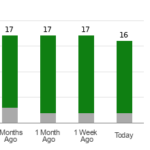PDD (NASDAQ: PDD), more commonly known as Pinduoduo, has been making waves in China’s e-commerce industry. As the country’s third largest e-commerce company by annual revenue, Pinduoduo has positioned itself as a formidable competitor to industry giants such as Alibaba (NYSE: BABA) and JD.com (NASDAQ: JD). Despite its relative youth, Pinduoduo has exhibited rapid and sustained growth, outpacing its larger counterparts in terms of expansion and revenue generation.
In just nine years since its founding, Pinduoduo has experienced explosive growth, propelled by a compound annual growth rate (CAGR) of 78% from 2018 to 2022. Projections for 2023 suggest an even higher CAGR of 81%. Notably, Pinduoduo achieved profitability based on generally accepted accounting principles (GAAP) in 2021, with its net profit nearly quadrupling in 2022. Industry analysts foresee a further 49% increase in earnings for the company in 2023.

Image source: Getty Images.
While Pinduoduo’s impressive growth trajectory has drawn attention, the pivotal question arises: can Pinduoduo evolve to surpass Alibaba and JD as the “Amazon” (NASDAQ: AMZN) of China? To answer this, we must scrutinize Pinduoduo’s business model and growth strategy and compare it to the trajectory of Amazon.
Comparing Pinduoduo to Amazon
Though both Pinduoduo and Amazon operate as major e-commerce entities, their operational structures diverge significantly. Pinduoduo established itself as a third-party marketplace, shifting away from its lower-margin first-party marketplace model in 2021 to enhance profitability. In contrast, Amazon continues to operate first-party and third-party marketplaces concurrently.
Pinduoduo’s unique marketplace approach leverages social media platforms to facilitate bulk discounts through collaborative purchasing, a strategy that has effectively captured market share in lower-tier cities across China. While Amazon primarily reserves bulk discounts for businesses, certain third-party Amazon sellers do offer bulk deals.
Furthermore, Pinduoduo’s absence of first-party brick-and-mortar stores diverges from Amazon, which boasts its own physical outlets such as Amazon Go, Amazon Fresh, and Whole Foods Market. Both companies engage in online fresh produce sales, yet Pinduoduo’s direct farmer-to-shopper model sets it apart as China’s leading online agricultural platform.
Notably, Pinduoduo’s international presence through Temu, a cross-border marketplace, has seen considerable success, with the app enjoying high popularity in the U.S., Europe, and other markets. Amazon connects Chinese sellers with international buyers through its third-party marketplace.
While Amazon’s ownership of Amazon Web Services (AWS) has fortified its profitability, Pinduoduo lacks a comparable cloud platform. Nevertheless, economies of scale have bolstered Pinduoduo’s overall profitability.
Pinduoduo’s Resemblance to Amazon in 2010
Forecasts indicate that Pinduoduo is set to achieve revenue of 235.8 billion yuan ($33.1 billion) in 2023, placing it on par with Amazon’s revenue in 2010, which amounted to $34.2 billion. Leading up to 2010, Amazon realized a remarkable 32% CAGR in revenue from 2005 to 2010. In comparison, Pinduoduo is projected to maintain a striking five-year CAGR of 78% from 2018 to 2023.
In the period from 2010 to 2023, Amazon’s revenue is anticipated to grow at a 24% CAGR, reaching $570.9 billion. If Pinduoduo mirrors this growth rate over the next 13 years, it could conceivably achieve revenue of 4 billion yuan ($562 billion) by 2036. Consequently, Pinduoduo’s projected 46% CAGR from 2022 to 2025 paints a compelling picture of its potential to emerge as the “next Amazon.”
The Unpredictable Challenges Ahead
Despite Pinduoduo’s promising trajectory, investors must remain attentive to the looming regulatory hurdles. The company capitalized on China’s antitrust crackdown on Alibaba in 2021, which restrained its primary competitor through the prohibition of aggressive promotions and exclusive merchant deals. This regulatory climate, however, could potentially pose analogous challenges for Pinduoduo should it surpass Alibaba in scale.
Moreover, escalating U.S.-China tensions raise the specter of intensified scrutiny on Pinduoduo’s international expansion by U.S. regulatory authorities. Google’s suspension of Pinduoduo’s main app from its Play Store, coupled with allegations of spyware raised by Grizzly Research, illustrate the potential obstacles awaiting Pinduoduo abroad. Despite Pinduoduo’s relocation of its headquarters from Shanghai to Dublin, its Chinese origins may still impede overseas expansion, thwarting its prospects as a driving force for sustained growth.
Can Pinduoduo Emerge as the Definitive “Amazon of China”?
With an enterprise value of $165 billion, Pinduoduo stands in relative diminution beside Amazon, valued at a staggering $1.68 trillion. At a modest 22 times next year’s earnings, Pinduoduo’s stock presents a reasonably valued investment opportunity. Although the path forward may be fraught with challenges, ample space for expansion hints at the potential for Pinduoduo to ultimately surpass Alibaba and JD as the preeminent “Amazon of China” in the coming decades.
Should you invest $1,000 in PDD Holdings right now?
Before considering a stake in Pinduoduo, it is imperative to weigh the insights of seasoned analysts. The Motley Fool Stock Advisor team has singled out what they believe to be the 10 best stocks for investors to pursue for substantial returns in the years ahead, offering a comprehensive roadmap for building a flourishing portfolio.
*Stock Advisor returns as of January 16, 2024
John Mackey, former CEO of Whole Foods Market, an Amazon subsidiary, is a member of The Motley Fool’s board of directors. Suzanne Frey, an executive at Alphabet, is a member of The Motley Fool’s board of directors. Leo Sun has positions in Amazon. The Motley Fool has positions in and recommends Alphabet, Amazon, and JD.com. The Motley Fool recommends Alibaba Group. The Motley Fool has a disclosure policy.





